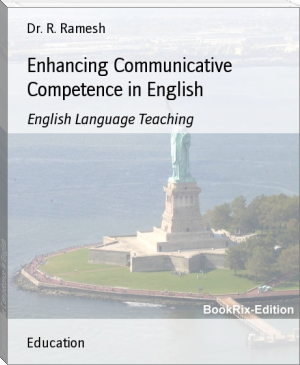Multicultural Skills (manual coursebook) by Asier Barandiaran, Dmitrii Enygin, Venera Midova (best beach reads of all time .txt) 📖

- Author: Asier Barandiaran, Dmitrii Enygin, Venera Midova
Book online «Multicultural Skills (manual coursebook) by Asier Barandiaran, Dmitrii Enygin, Venera Midova (best beach reads of all time .txt) 📖». Author Asier Barandiaran, Dmitrii Enygin, Venera Midova
Part 1. Intercultural Basics…………………………………………….5
Part 2. Stereotyping…………………………………………………..10
Part 3. Communication in the Multicultural World…………………..14
Part 4. Test your Level of Tolerance………………………………….23
Express questionnaire "Index of Tolerance»………………………....23
Questionnaire for Measuring Tolerance……………………………...25
Diagnosing general communicative tolerance…………………...….28
Acceptance skills………………………………………………….….35
Measurement questionnaire for general social attitudes……………..36
Ethnical Identity……………………………………………………...36
Part 5. Conflict resolution…………………………………………….41
Part 6. Webquest Project World………………………………………56
Webquest. EU Documents………………………………………....…56
Webquest. Tolerance.……………………………………………....…56
Case study. Expert area……………………………………………….56
Project. The tolerance code……………………………………….......58
Project. The tolerance tree…………………………………………....59
Project. What do we have in common?................................................59
Project. "Image of Tolerance"..............................................................59
Roleplay. "Magic Shop".......................................................................60
Creative task. “Five Good Words”.......................................................60
Game. "What does my belonging know about me?"............................60
Game. "Rejoice Me".............................................................................61
Roleplay. "How to be Tolerant in Communication".............................61
Webquest Project. "Map of Intolerance"..............................................62
Game. "Unknown Ideal Worlds"..........................................................62
Empathy task. "Understand Me"..........................................................63
Empathy task. "Eye to Eye".................................................................63
Role play. "Migrant World".................................................................64
Game. "Bridge"...................................................................................64
Creative task. "Who and what I am"...................................................65
Parable Discussion…………………………………………………...66
Tolerance Poetry……………………………………………………..67
Project. Holidays of Different Nations……………………………....68
PREFACE
Today's World is in urgent need of developing people’s tolerance and empathy in terms of intercultural communication issues, due to the growing number of misunderstandings leading to conflicts.
The sooner the process of developing tolerance skills starts the better it is. University environment is a great space for doing this, due to the multicultural composition of students groups.
English is the best subject which allows to develop multicultural skills, thanks to its cultural bridging origin.
This practice book is aimed at helping university instructors to organise the process of developing intercultural tolerance and empathy skills.
The book includes four main chapters devoted to working on such essential multicultural issues as intercultural basics (fundamental skills of dealing with representatives of different cultures), stereotyping (exercises helping students to overcome intercultural bias), communication in the multicultural World (activities aimed at developing communicative skills and enabling conversational strategies with different cultures) and testing of tolerance level (the tasks and tests depicting students level of tolerance).
There is also one additional special chapter for teachers “Webquest Project World” that consists of a lot of task- , web- , and project-based assignments for your students that can be used as a creative rating exercises for your English curriculum.
PART 1. INTERCULTURAL BASICS
Task1. Below are five alternative definitions of cultures. Which definition(s) of culture do you prefer? You can choose as many as they wish.
1. Objective visible artefacts such as rituals, superstitions, heroes, myths, symbols and taboos.
2. Basic truths about identity and relationships, time and space, ways of thinking and learning, ways of working and organizing, and ways of communicating.
3. Ideals shared by group members to which strong emotions are attached.
4. The `right' and 'wrong' ways of doing things. The rules people live by in practice.
5. Subjective behavioural orientations to do things in one way, rather than another. They are most noticeable in relationship styles, thinking and learning styles, organization and work styles and communication styles.
Task 2.
Think about another country or culture.
Complete the checklist answering Yes, No or Don’t Know to each question.
Where you answer Don’t Know, how will you find out about the answer to this cultural question?
Non verbal communication
Should I expect differences in what is thought of as appropriate 'personal space'?
Should I anticipate differences in the way my counterparts use touch?
Is there anything particular I need to be careful about in giving or receiving business cards?
Should I avoid any particular gestures?
Should I expect differences in the level of acceptable eye contact?
Do I know what body language is taboo?
General Communication
Should I anticipate different attitudes about the acceptability of asking personal questions?
Should I anticipate different attitudes towards the acceptability of humour and emotions?
Should I anticipate different attitudes towards the acceptability of interrupting?
Do I know what type of argument is likely to be most persuasive?
Should I anticipate a different attitude towards addressing difficult issues directly?
Do I know what style of feedback is acceptable?
Should I anticipate different expectations about the expression of criticism?
Should I anticipate different expectations about the expression of anger?
Should I anticipate different expectations about the formality of feedback?
Do I know the range of ways in which disagreement is likely to be expressed?
Should I expect a different style of conflict resolution?
Should I anticipate different expectations about the use of silence?
Should I anticipate different communication styles to be in use?
Do I know when to use first names and surnames?
Do I know what professional titles to use?
Should I anticipate different attitudes towards small-talk?
Should I anticipate different attitudes towards the importance of saving face?
Should I anticipate a different use of tone or pitch when speaking?
Should I expect different attitudes towards displays of affection?
Task 3. Read carefully through the following categorizations.
Missionaries
Missionaries exhibit denial. They simply cannot conceive that others can operate successfully on a completely different value system, or that other ways of doing things have merit and logic. When missionaries see people doing things differently, they do not see the influence of culture. Instead, they make rapid judgements about the individuals concerned, or draw on out-of-date and prescriptive stereotypes. These judgements, based on the missionaries' own conception about how things 'should' be, often classify other people as backward, unsophisticated or uneducated. The missionary sees their role as educating others in the 'right' way to do things.
Expats
Expats exhibit defence. They recognize that there are, indeed, other ways of doing things, but in general judge them to be vastly inferior to 'our ways of doing things' back home. They recognize the existence of another set of values and behaviours, but continue to make faulty attributions or interpretations from their own ethnocentric perceptions, often with negative judgements attached. In the expats' world, there is limited space for shades of grey and precious little empathy with other cultures. Expats often keep contact with people from other cultures at a minimum.
Neo-natives
Neo-natives also exhibit defence. However, in an opposite response to expats, they begin to assume that everything about the new culture is good and nothing bad. They sometimes see the new culture as more spiritual, or in some ill-defined way 'better' than their own. They can even stereotype or deride their own cultural background as inferior. For neo-natives almost everything is black and white and they have little time for their own compatriots. Neo-natives see it as their role to become experts in their new culture, to become 'more French than the French'.
Global villagers
Global villagers exhibit minimization. They admit to a minimal number of differences between cultures, but only at a superficial behavioural level. They consider that 'underneath, everyone is the same' and are unsympathetic to the idea of deeper differences in assumptions and values. They believe that what works here will, with perhaps some simple superficial modifications, work everywhere else. In the global villagers' world, differences are sidelined or ignored. Instead, global villagers see it as their role to identify similarities. They may even disparage those who seek to acknowledge cultural variation as being bigoted or prejudiced.
Now, read each of the quotes below, which have all been adapted from quotes. Decide which of the categorizations above (if any) is applicable to each.
A. 'Since I came to live in Thailand I have realized just how shallow and meaningless life in Europe is. The stress and anxiety that everybody suffers ... and for what? I'll never go back.' (Irish doctor on assignment in Thailand)
B. 'I just can't believe how lazy the British are. Unmotivated, unenthusiastic and disinterested. Now I just do not employ any at all, full stop. We only have Australians or New Zealanders working in the London office.' (US manager of the London subsidiary of a New York-based architecture firm)
C. 'I can't tell you how many stupid things people say about business in China, all this rubbish about Guanxi. * It is just garbage. The Chinese are the same as everyone else. If you have the right business model, the right technology and properly incentivize your staff, you will win business. Full stop.' (Scottish CEO of manufacturing exporter) *System of networking and mutual favours said to underpin business relationships in China.
D. 'Working for a music business our people are much the same all over the world. In fact we look for the same type of people when recruiting. As a result cultural differences don't come into the equation.' (French HR manager)
E. 'Although the older Poles are difficult to deal with, the younger people we employ have just as clear an idea of the importance of meeting deadlines and getting things done on time as people in the US.' (American production director in Polish car components manufacturer)
F. 'We really have such a strong belief in ourselves in this organization, an awareness that we are really unique and different, that where we come from as individuals is irrelevant. We drop our nationality and become "one of us".' (Brazilian employee in a worldwide charity)
G. 'There is really almost nothing in this country that works properly. I know it is wrong, but I can't help comparing everything here with the situation at home. It frustrates me because the people themselves don't seem to understand how much better things could be if they put their minds to it.' (Western European voluntary worker in Africa).
PART 2. STEREOTYPING
Task 1. A British trainer recently asked colleagues from Australia, France, Germany, Italy, Spain and the USA to describe a stereotype that is held in that culture about the British.
Match the stereotype with the culture that holds it.
1. The British have bad teeth.
2. The British treat their children badly.
3. The British are insular.
4. The British do not wash.
5. The British are obsessed by time.
6. The British are hypocrites.
How helpful or true are these stereotypes about people in the UK?
What stereotypes do you hold about the people in other cultures or countries? How helpful are these stereotypes?
Task 2. Think carefully about another country or culture.
Identify some of the key background and environmental factors that influence this culture. Then speculate on the culture's core attitudes and values, and how these are reflected in observable behaviours.
Background facts:
Core attitudes:
Observable behaviours:
How can it help you in building bridges with the representatives of these cultures?
Task 3. Think about your culture. What stereotypes can come to place in the following work situations? Compare your findings with other students in class.
make hiring decisions
conduct your initial orientation interview
mentor employees (or not!)
make job assignments
give people training opportunities
listen to people’s ideas and suggestions
make promotional choices
give performance reviews
decide organizational policy
conduct marketing campaigns
choose board members
treat customers
Task 4. Discuss in pairs the following tips about overcoming bias at the workplace.
Recognize that as human beings, our brains make mistakes without us even knowing it. The new science of “unconscious bias” applies to how we perceive other people. We’re all biased and becoming aware of our own biases will help us mitigate them in the workplace.
Reframe the conversation to focus on fair treatment and respect, and away from discrimination and “protected classes”. Review every aspect of the employment life cycle for hidden bias – screening resumes, interviews, onboarding, assignment process, mentoring programs, performance evaluation, identifying high performers, promotion and termination.
Ensure that anonymous employee surveys are conducted company-wide to first understand what specific issues of hidden bias and unfairness might exist at your workplace. Each department or location may have different issues.
Conduct anonymous surveys with former employees to understand what were the issues they faced, what steps could be taken for them to consider coming back, whether they encourage or discourage prospective employees from applying for positions at your company and whether they encourage or discourage prospective customers/clients from using your company’s products or services.
Offer customized training based upon survey results of current and former employees that includes examples of hidden bias, forms of unfairness that are hurtful and demotivating, and positive methods to discuss these issues.
Offer an anonymous, third-party complaint channel such as an ombudsperson; since most of the behaviors that employees perceive as unfair are not covered by current laws – e.g. bullying, very subtle bias – existing formal complaint channels simply don’t work.
Initiate a resume study within your industry, company and/or department to see whether resumes with roughly equivalent education and experience are weighted equally, when the
 The desire to acquire knowledge about the surrounding world and human society is quite natural and understandable for a person. Life is so developed that an uneducated person will never occupy a high position in any field. Humanity in its mass, and each person individually, develops objectively, regardless of certain life circumstances and obstacles, but with different intensity. The speed of development depends on the quality of training.
The desire to acquire knowledge about the surrounding world and human society is quite natural and understandable for a person. Life is so developed that an uneducated person will never occupy a high position in any field. Humanity in its mass, and each person individually, develops objectively, regardless of certain life circumstances and obstacles, but with different intensity. The speed of development depends on the quality of training.




Comments (0)